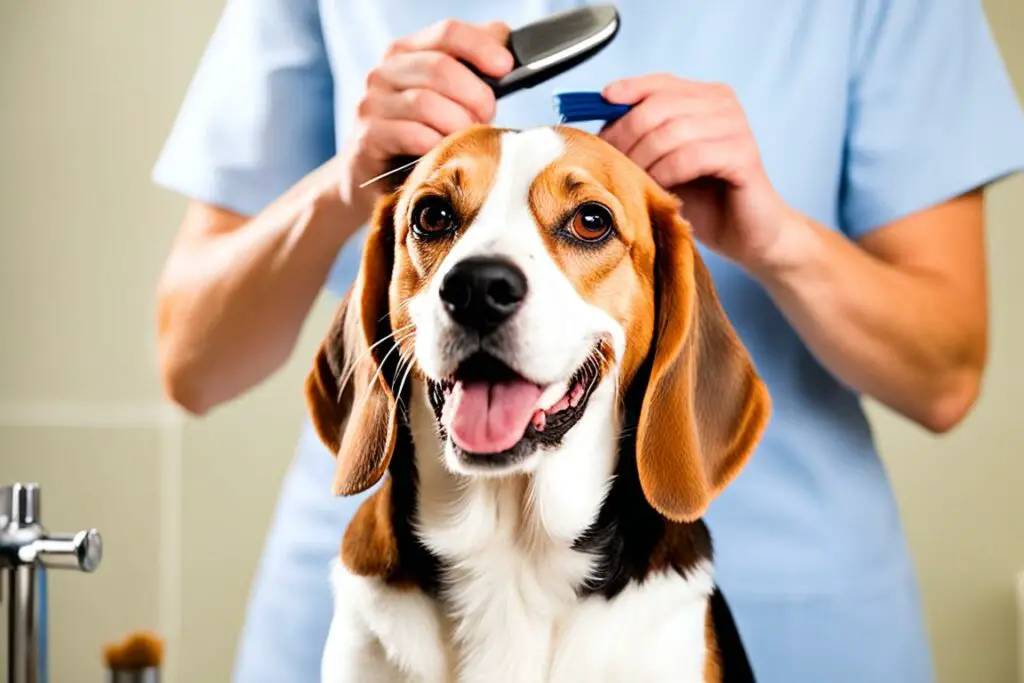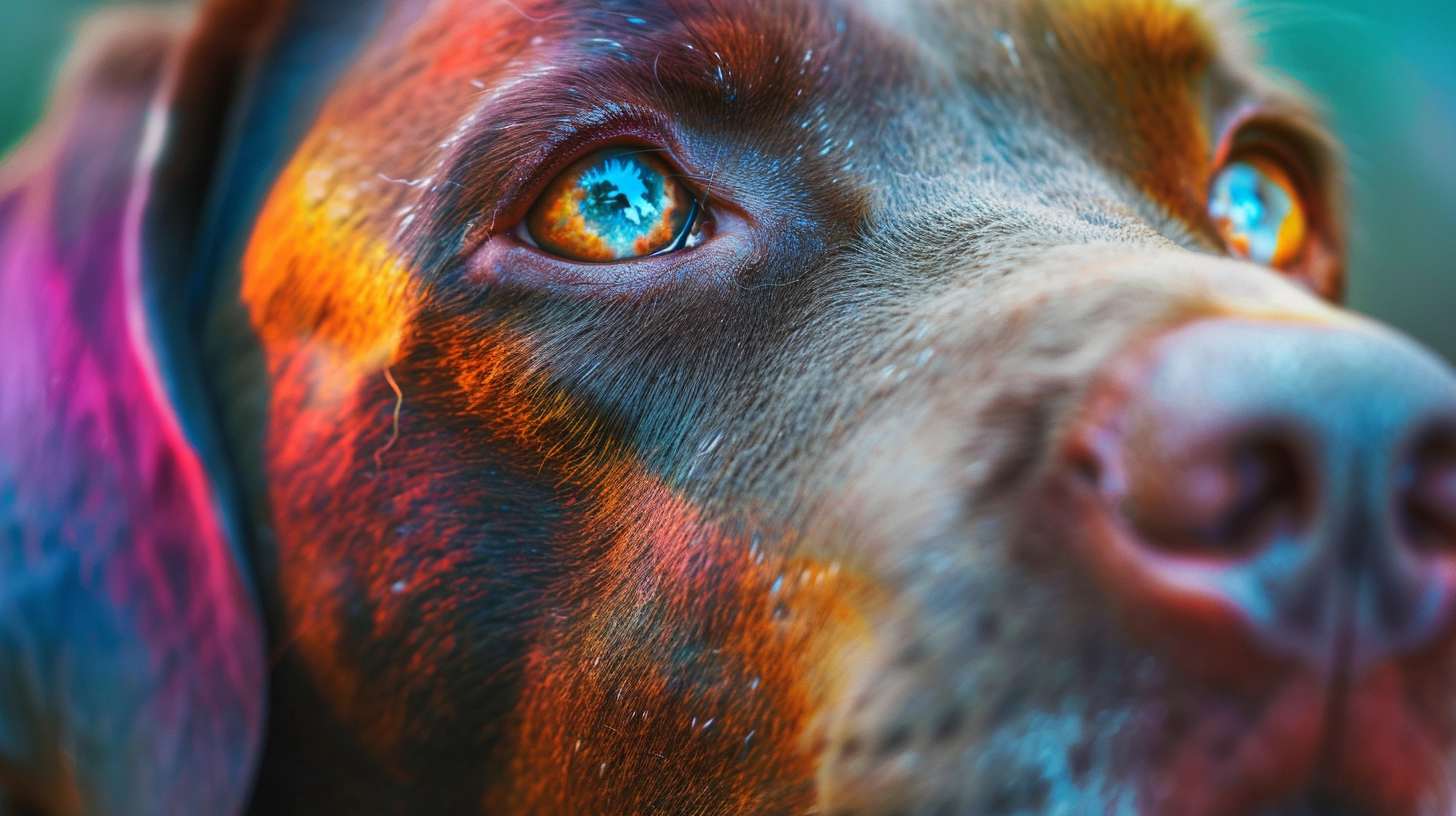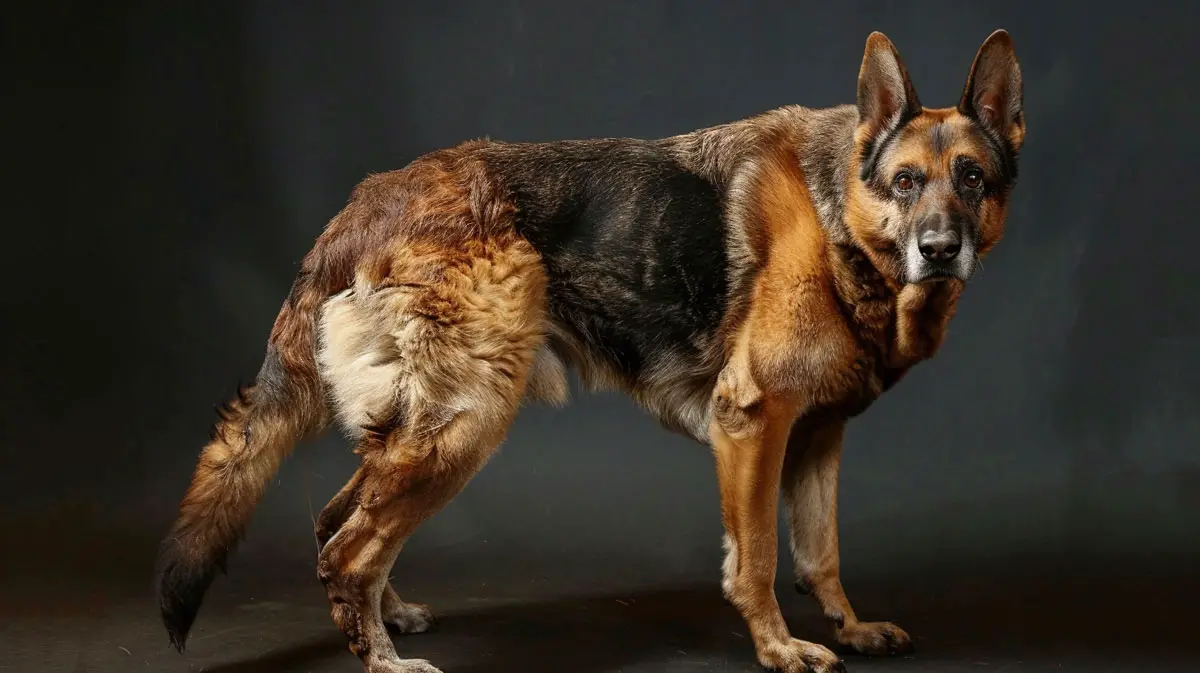Did you know Beagles are a top dog breed in the United States? They’re known for their friendly nature, cute looks, and playful spirit. Keeping a Beagle happy and healthy has its challenges. This guide offers invaluable tips and information for your Beagle’s care.
Key Takeaways:
- Beagles are one of the most popular breeds in the United States.
- This Beagle care guide will provide valuable tips for keeping your Beagle happy and healthy.
- Understanding the unique characteristics and history of Beagles is essential for their care.
- Proper nutrition, exercise, grooming, and veterinary care are vital for your Beagle’s well-being.
- Training and socialization are key to raising a well-behaved companion.
Understanding Beagle Characteristics and History
The Beagle is a loved hound family member with unique characteristics. To give your Beagle the best care, knowing their history and traits is crucial.
“Beagles have a rich history that dates back centuries. Initially, they were bred for hunting, especially tracking small game like rabbits and hares. This has shaped their physical traits and instincts, seen in Beagles today.”
Beagles have an impressive sense of smell, thanks to their 220 million scent receptors. Their amazing olfactory prowess makes them great at search and rescue and detecting prohibited items at airports.
Beagles are friendly and outgoing. They enjoy being part of a loving family and are great companions for all ages, including children.
Beagles have a compact, sturdy build. This well-muscled body supports their energy during long walks or outdoor adventures.
Beagles have short coats that are easy to care for. Their sleek, dense fur protects them in harsh weather during hunts.
The Beagle’s Size and Temperament
Beagles are a medium-sized breed. They usually stand 13 to 15 inches tall at the shoulder and weigh 20 to 30 pounds.
Their temperament is merry and friendly. Beagles are intelligent but can be a bit independent. Training might be challenging, but patience and positive reinforcement work wonders.
“Understanding a Beagle’s history and traits is important for their care. By knowing their innate qualities, you can provide a loving environment for them to thrive.”
Having explored the interesting characteristics and history of Beagles, we will now look into their care and well-being.
The Importance of Knowing Your Beagle’s Heritage
Knowing about your Beagle’s background and character is essential. They come from a long line of hunters. This history affects how they act and what they need.
Beagles are friendly and love making friends. They enjoy being around people and feel part of a family. With their calm and kind ways, they are perfect pets for kids.
Understanding their inborn behaviors is vital. Beagles have a sharp sense of smell and love to explore. Keeping them mentally and physically busy keeps them satisfied.
Here are some key things to think about:
- Exercise is crucial for Beagles. They need to stay active to be happy. Daily walks and safe places to sniff are a must.
- Training should be consistent and positive. Beagles are smart but like to do things their own way. Good training ensures they listen and behave.
- Activities like puzzle toys and scent games keep their mind sharp. These fulfill their hunting instincts and prevent boredom.
“Understanding a Beagle’s roots is important for their happiness and health. Knowing how they think and what they require helps create a loving home.”
– Beagle Care Expert
Acknowledging your Beagle’s heritage is key. It molds their personality and how they act. By giving them the right kind of care, you strengthen your bond. This makes their life joyous and rewarding.
Optimal Nutrition for Your Beagle
Optimal nutrition is key for your Beagle’s health over time. A good diet gives them the nutrients to grow strong. We’ll look at what makes a good diet for Beagles and how to pick the best food and treats.
Choosing High-Quality Beagle Food
Picking the right food means finding something high-quality. It should match their diet needs. You want food that has great ingredients, not just fillers or artificial stuff. Beagles need a mix of proteins, fats, and carbs. There’s food made just for small breeds or adult Beagles.
Consider these when choosing their food:
- Animal proteins like chicken or fish are great for their energy and muscles.
- Fats like salmon oil help keep their coat shiny and them healthy.
- Carbs like sweet potatoes give them energy that lasts.
- Stay away from allergens like corn or wheat that can upset their stomachs.
Incorporating Healthy Beagle Treats
Treats help in training and bonding but should still be healthy. Pick ones made for Beagles or small dogs. They’re usually less in calories and fit their size better.
When picking treats for your Beagle:
- Choose treats with great ingredients and no artificial additives.
- Dental chews are great because they clean teeth too.
- Skip treats that are too fatty or sugary. They can make your Beagle overweight.
The Debate Around Grain-Free Diets
Grain-free diets are popular. Some think they’re better for their Beagle. But it’s important to know the benefits and risks. Always talk to your vet before making big diet changes.
Some dogs might be allergic to grains. But most Beagles are fine with them. Grains can give them fiber and nutrients. If your Beagle has food allergies, grain-free might be an option. Your vet can help you decide.
“Picking the right dog food, healthy treats, and thinking about grain-free diets help Beagles stay healthy.”
| Key Factors | Considerations |
|---|---|
| High-quality Beagle food | – Quality ingredients – Suitable for small breeds |
| Healthy treats | – High-quality ingredients – Dental health benefits |
| Grain-free diets | – Consult with a veterinarian before making changes |
Caring about your Beagle’s diet is key for their health. Always talk to your vet for advice specific to your pet. A healthy diet means a happy Beagle!
The Beagle’s Exercise Regimen
Beagles are full of energy and need regular exercise. This keeps them healthy and happy. They have a strong instinct to sniff and explore. So, it’s important to have different activities to meet their exercise needs.
Making an exercise plan for your Beagle can be fun. You and your pet will enjoy it. Here are some activities to try:
- Brisk Walks: Daily walks are key for their health. Aim for at least 30 minutes each day. This helps keep their muscles strong and energy levels balanced.
- Interactive Play: Beagles love to play with their owners. Try games like fetch or use puzzle toys. These provide mental and physical exercise.
- Controlled Running: Beagles enjoy running. Allow them short runs in safe areas. This helps them use up extra energy. Make sure the area is secure to keep them safe.
A tired Beagle acts better. Regular exercise prevents bad behavior and health issues. It also helps avoid obesity.
Each Beagle is different. Their exercise needs can change based on their age and health. Talk to your vet for advice on the best routine.

Hydration and Water Quality for Beagles
It’s very important for your Beagle to stay hydrated. Just like us, dogs need clean water to be healthy and strong. But, it’s not enough to just give them water. You should also think about how clean the water is.
Tap water might have stuff in it that’s not good for your dog, like chlorine or pesticides. These things can hurt your Beagle’s tummy, skin, and keep them from getting sick less often. So, getting a good water filter for pets is a smart move.
With a water filter, the water your Beagle drinks will be clean and safe. These filters take out the bad stuff and make sure your dog gets top-notch water.
A water filter does more than keep your Beagle healthy. It also lets you know you’re doing your best to keep them safe from bad things in the water. When they have clean water all the time, they’re more likely to be well-hydrated and happy.
Securing Your Beagle During Car Journeys
Traveling with your Beagle requires proper safety steps in the car. A Beagle moving freely can be a hazard, posing risks to everyone. By using **Beagle car restraints**, you ensure they are safe and secure.
Here are ways to keep your Beagle safe in the car:
- **Certified canine car booster seats**: These seats lift your Beagle up, giving them a comfy and secure spot. The booster seat attaches to the car’s seat and includes a leash or harness to keep your Beagle in place.
- **Belt restraint systems**: These systems have adjustable straps that link your Beagle’s harness to the car’s seatbelt. They help your Beagle stay put while allowing a bit of movement. It’s key to get a dog-specific restraint for their safety.
- **Sturdy harnesses**: Car travel harnesses come with loops to attach to the car’s seatbelt. This secures your Beagle from moving too much. Choose a harness that fits well and is strong for best safety.
It’s vital to follow the manufacturer’s guide to set up Beagle restraints correctly. Always make sure the restraints or harnesses fit your Beagle well, making them comfortable without limiting movement or causing discomfort.
Tip: Ease your Beagle into car restraints with short trips. Reward them with treats and praise. This makes car travel fun for both of you.
Securing your Beagle in the car is key for their protection. It also keeps the driver focused, making the trip safer and more pleasant for all. With the right **Beagle car safety** steps, you can travel worry-free.
| Pros | Cons |
|---|---|
| Elevates Beagle for better visibility and comfort | May not fit all car models |
| Restricts movement and reduces distractions | Some Beagles may resist being restrained |
| Provides extra protection during sudden stops or accidents | Can be an added expense for owners |
Regular Veterinary Care for Beagles
Keeping your Beagle healthy needs ongoing vet visits. It’s key to catch any health problems early. This keeps them living a long, joyful life.
Beagles need regular health checks just like people do. At these visits, vets check them over and spot any health problems. They also offer tips on diet, exercise, and care for Beagles.
Vaccines are also crucial for your Beagle. They prevent serious diseases like distemper and rabies. Make sure to stick to the vaccine schedule your vet suggests.
“Being active in your Beagle’s health care makes a huge difference. Routine visits and vaccines are essential for a happy, healthy life.”
It’s important to have a good relationship with your vet. They can advise on dental care, managing weight, and tests needed as your Beagle gets older.
Common Beagle Health Issues
Beagles are usually healthy but can have certain issues. It’s good to know these and talk about them with your vet.
- Obesity is common since Beagles love to eat. Regular vet visits help keep their weight in check.
- Ear Infections can happen because of their floppy ears. Vets can spot and prevent these during check-ups.
- Eye Problems like glaucoma may occur. Regular checks can catch these early.
- Hypothyroidism affects their hormones. Blood tests at vet visits can diagnose this.
Catching problems early is important for your Beagle’s health. Regular vet visits and vaccines are key to their well-being.
Let’s see a comparison of how often Beagles should get check-ups and vaccines.
| Check-ups | Vaccinations |
|---|---|
| Annual wellness exam | Core vaccinations (distemper, parvovirus, adenovirus) |
| Regular dental check-ups | Rabies vaccination |
| Weight management assessment | Bordetella vaccination (kennel cough) |
| Senior health screenings (for older Beagles) | Additional vaccinations as recommended by your veterinarian |
Always talk to your vet for advice suited to your Beagle’s needs. They’re key to ensuring your Beagle gets the best care.
Grooming Tips for Beagles
Beagles have a short, dense coat that’s easy to care for. But they still need regular grooming to stay looking and feeling great. Here are some key tips for taking care of your Beagle’s coat and hygiene:
1. Regular Brushing
Brush your Beagle’s coat once or twice weekly to get rid of loose hair and prevent mats. Use a gentle brush or grooming mitt. Brushing not only helps their coat shine but also builds your bond.
2. Ear Cleaning
Beagles often get ear infections because of their floppy ears and love for the outdoors. To keep their ears healthy, check and clean them with a vet-recommended solution. Never poke inside their ear canal. If their ears seem sore or smelly, see your vet right away.
3. Nail Trimming
Trimming nails keeps your Beagle comfy and prevents pain. Long nails can hurt their feet and mess up their walking. Use proper dog nail clippers or get professional help. Take care not to cut the quick, which can bleed.
4. Dental Care
Good dental health is a must for your Beagle’s well-being. Brush their teeth often with pet-safe products. This prevents tartar and gum issues. You can also use vet-approved dental snacks for extra cleaning.

Grooming is more than just clean-up; it’s bonding time. Be kind, and use treats and love to make grooming fun. This strengthens your friendship with your Beagle.
Beagle Training and Socialization
Training and socialization are key for a well-behaved Beagle. Positive methods and consistency are critical. Also, starting socialization early can make a huge difference.
Beagle training should focus on rewards for good behavior. Treats, praise, and love work well. Beagles love this approach because they like food and exploring.
For Beagle training, be consistent. Have clear rules and routines. Everyone in the family should follow them. This helps your Beagle feel secure and learn better.
Early socialization is crucial. Take your puppy to different places and meet various people and pets. Walks, friendly dogs, and having guests over are good for social skills.
Puppy classes or obedience programs are great for your Beagle. They offer socializing chances and training tips. It’s a good way to bond with your Beagle.
Socializing your Beagle should never stop. Keep introducing them to new experiences. And always reinforce positive behavior to keep them friendly and social.
Patience is important when training your Beagle. They learn at their own pace. Celebrate the small steps and always encourage them.
Tips for Successful Beagle Training:
- Start training early to establish good habits and behaviors.
- Use positive reinforcement with treats, praises, and affection.
- Be consistent with commands, rules, and routines.
- Expose your Beagle to various people, animals, and environments for socialization.
- Consider enrolling your Beagle in puppy classes or obedience training programs.
- Stay patient and celebrate small victories.
| Training Tips | Socialization Tips |
|---|---|
| Use positive reinforcement | Expose your Beagle to different environments |
| Be consistent with commands | Introduce your Beagle to other friendly dogs |
| Start training early | Invite guests to interact with your Beagle |
| Consider professional training programs | Continue socializing throughout your Beagle’s life |
Conclusion
You now know how to look after your Beagle, ensuring they’re happy and healthy. Just follow some easy tips and take important steps. This way, your Beagle will thrive.
A good diet is key for your Beagle’s health. Give them top-notch dog food and snacks. This supports their health. Keeping your Beagle active with regular exercise is also vital.
Groom your Beagle often to keep their coat nice and them clean. Also, regular vet visits and shots are a must to keep them healthy.
These care tips will help you build a deep connection with your Beagle. You’ll share many happy moments together.
FAQ
What is the history of the Beagle breed?
What are the characteristics of Beagles?
How should I provide a balanced diet for my Beagle?
How much exercise do Beagles need?
How important is hydration for Beagles?
How can I secure my Beagle during car journeys?
How often should I take my Beagle to the vet?
How should I groom my Beagle?
How can I train and socialize my Beagle?
Source Links
- https://www.pinterest.com/pin/your-happy-healthy-pet-guides-beagle-an-owners-guide-to-a-happy-healthy-pet-hardcover-walmartcom–112027109519650237/
- https://www.everand.com/book/264132206/Beagle-An-Owner-s-Guide-to-a-Happy-Healthy-Pet
- https://www.articlesfactory.com/articles/animals-and-pets/beagle.html





Leave a Reply